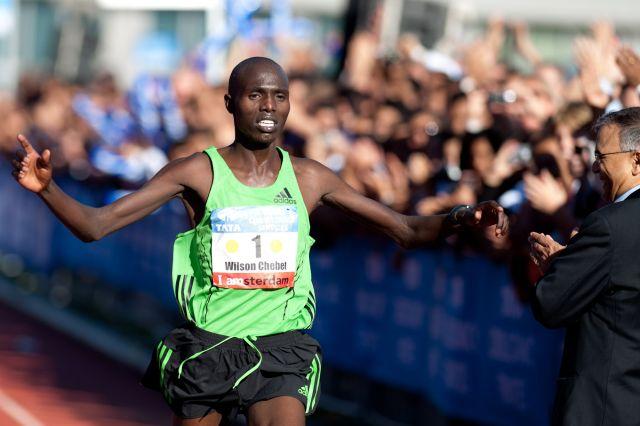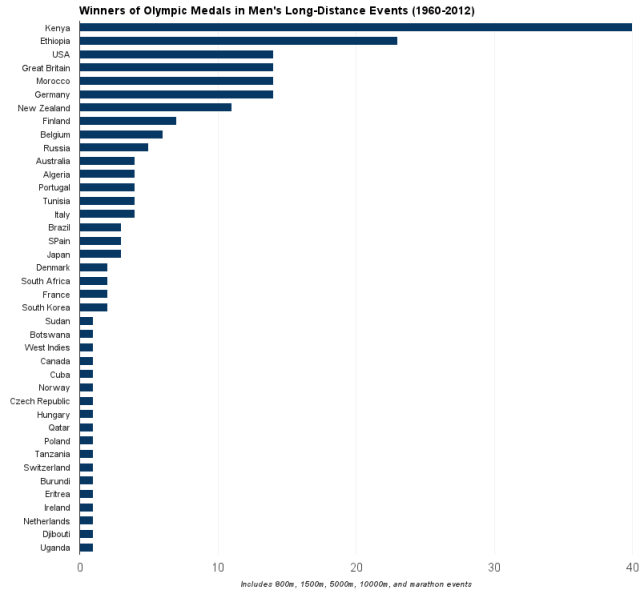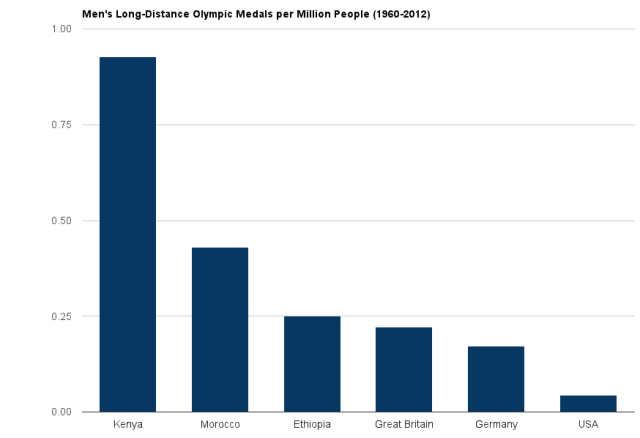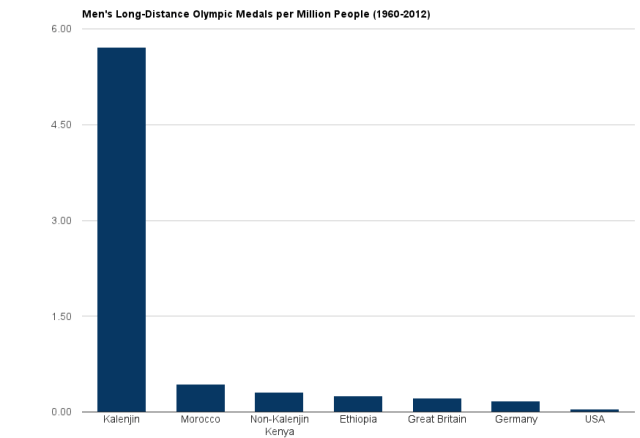
Source: Wikipedia
Have you noticed how Kenyan runners have dominated marathons for the past several decades? In case you haven’t, take a look at the top marathon times ever. A quick skim shows that only Ethiopians can keep up with them.
At the world’s biggest stage for long-distance runs, Kenyan dominance is even more clear. Here’s the breakdown of medal winners for all men’s long-distance events in the Olympics from 1960 to 2012 :

Data via Wikipedia
Out of a possible 210 medals across 5 events, Kenyan runners have won 40 of them, or almost 20%. No other country comes close– Ethiopia stands a distant second with right over 20 medals.
This is impressive for a nation with a population of less than 1/6th of the United States. Kenya has under 50 million people, and the United States over 300 million. Looking at medals per million people for the top 6 countries, the Kenyan dominance looks even more daunting:

Data via Wikipedia
There’s about one men’s long-distance medal for every 1 million Kenyans. Compare that to the United States, where there’s about one winner for every 25 million Americans.
But if you dig deeper into the data, it’s not actually the case that “Kenyans” are great at marathons. More accurately, it’s a specific ethnic group in Kenya called the Kalenjin. The Kalenjin live in the mountainous Rift Valley Province, and they have won 28 of Kenya’s 40 medals from the past 60 years. They alone have produced the most men’s medalists in the world.
To put this in perspective, the Kalenjin have a population of 5 million. They make up 8% of Kenya’s population, but 70% of their medals. On a population-adjusted basis, it’s even more clear how much they dominate.

Data via Wikipedia
How can such a small population produce the world’s best runners? As with most mysterious phenomena, there’s no shortage of theories. One standard narrative is that Kenyans are great runners because they run several miles to and from school every day. But research found that to be misguided: 70% of the surveyed Kenyan marathon winners said they walked or took the bus to school. Plus, it doesn’t explain why the Kalenjin in particular are winning so many races.
So what is making these guys so good? Some scientists thought it might be the diets of Kalenjin runners, which are high in carbs and protein, and low in fat. As the researchers point out, though, this diet is the same as many endurance athletes around the world. But subsisting off of a healthy mix of meat, veggies, and dairy probably doesn’t hurt. Another study make the case that Kalenjin runners bodies are better suited to marathons than the average Kenyan.
Marathons require an absurd amount of mental strength– anyone who has run long distances knows the excruciating pain of “hitting the wall” and feeling like you can’t run any further.
Which brings us to the description of a pretty grueling Kalenjin ritual. In their early teens, Kalenjin boys undergo a rite of passage to manhood. With mud caked on their faces, these boys perform tasks such as crawling naked through stinging nettles, wiping their genitals with formic acid, and getting circumcised with a sharp stick. Throughout all of this, they must remain completely stoic. Cracks in the mud (signs of flinching) result in being labeled a coward. As Colm O’Connell, coach of many Kenyan runners, tells Radiolab:
“Your ability to withstand pain– that in a sense in the Kalenjin tradition made you a man.”
If you have been raised to ignore pain, persevering through one more mile doesn’t look so bad.
So perhaps a combination of diet, physiology, and culture makes the Kalenjin the kings of long-distance. And this proclivity makes for some interesting stories. In the late ‘80s, a Kalenjin student named Paul Rotich went to America for college. Realizing he needed a way to finance his education, he started gunning for a cross-country scholarship. Even though he admittedly wasn’t much of a runner, being overweight and out of shape at the time. But after a few months of training, he somehow made the varsity team. Paul improved so rapidly that he went on to win a full-ride scholarship. He also racked up 10 All-American honors in the process.
When Paul returned home to Kenya and told his cousin of his travails, the cousin replied:
“So it is true. If you can run, any Kalenjin can run.”
This post was written by Ammar Mian. Follow him on Twitter here. To get occasional notifications when we write blog posts, sign up for our email list.



